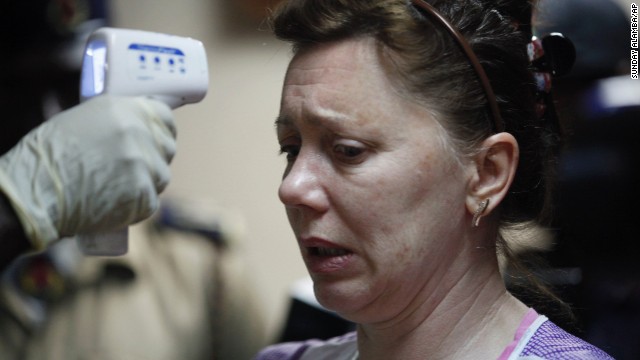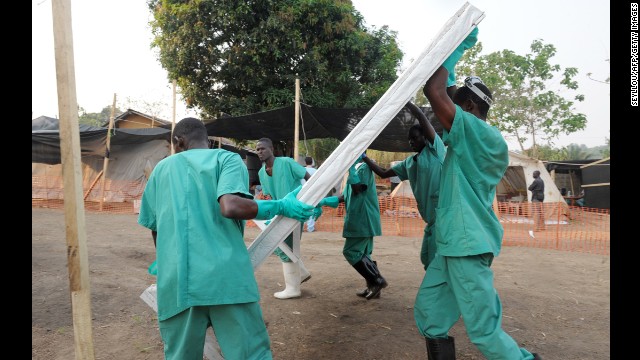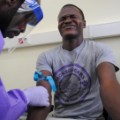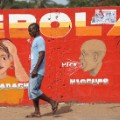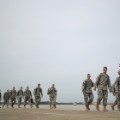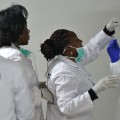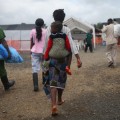Women in Monrovia celebrate after the World Health Organization declared Liberia Ebola-free on May 9, 2015. Other cases have recurred since, however. Two people in Liberia have died of the disease since the end of June, just weeks after the WHO declared the nation free of the disease.
A man walks past an Ebola awareness painting in Monrovia on March 22, 2015.
Soldiers from the U.S. Army's 101st Airborne Division walk across the tarmac at Campbell Army Airfield before reuniting with their families at a homecoming ceremony March 21, 2015 in Fort Campbell, Kentucky. The 162 soldiers were deployed in Liberia, where they helped fight the spread of Ebola.
Relatives weep for a loved one who it was believed died from Ebola, at a graveyard on the outskirts of Monrovia on March 11, 2015.
Doctors Without Borders staffer Alex Eilert Paulsen watches as mattresses and bed frames burn at the Ebola Treatment Unit in Paynesville, Liberia, on January 31, 2015. The organization reduced its number of beds from 250 to 30 as gains were made in battling the virus.
A child who survived the Ebola virus is fed by another survivor at a treatment center on the outskirts of Freetown, Sierra Leone, on November 11, 2014.
Health workers in Monrovia cover the body of a man suspected of dying from the Ebola virus on October 31, 2014.
Health officials in Nairobi, Kenya, prepare to screen passengers arriving at the Jomo Kenyatta International Airport on October 28, 2014.
U.S. President Barack Obama hugs Ebola survivor Nina Pham in the Oval Office of the White House on October 24, 2014. Pham, one of two Dallas nurses diagnosed with the virus, was declared Ebola-free after being treated at a hospital in Bethesda, Maryland. The other nurse, Amber Vinson (not pictured), was treated in Atlanta and also declared Ebola-free.
Health workers in Port Loko, Sierra Leone, transport the body of a person who is suspected to have died of Ebola on October 21, 2014.
Health workers bury a body on the outskirts of Monrovia on October 20, 2014.
Garteh Korkoryah, center, is comforted during a memorial service for her son, Thomas Eric Duncan, on October 18, 2014, in Salisbury, North Carolina. Duncan, a 42-year-old Liberian citizen, died October 8 in a Dallas hospital. He was in the country to visit his son and his son's mother, and he was the first person in the United States to be diagnosed with Ebola.
Boys run from blowing dust as a U.S. military aircraft leaves the construction site of an Ebola treatment center in Tubmanburg, Liberia, on October 15, 2014.
Aid workers from the Liberian Medical Renaissance League stage an Ebola awareness event October 15, 2014, in Monrovia. The group performs street dramas throughout Monrovia to educate the public on Ebola symptoms and how to handle people who are infected with the virus.
Ebola survivors prepare to leave a Doctors Without Borders treatment center after recovering from the virus in Paynesville, Liberia, on October 12, 2014.
A man dressed in protective clothing treats the front porch of a Dallas apartment on October 12, 2014. The apartment is home to one of the two nurses who were diagnosed with Ebola after treating Thomas Eric Duncan, a Liberian national who traveled to Dallas and later died from the virus.
A woman crawls toward the body of her sister as a burial team takes her away for cremation October 10, 2014, in Monrovia. The sister had died from Ebola earlier in the morning while trying to walk to a treatment center, according to her relatives.
A man digs a grave on October 7, 2014, outside an Ebola treatment center near Gbarnga, Liberia.
A person peeks out from the Dallas apartment where Thomas Eric Duncan, the first person diagnosed with the Ebola virus in the United States, was staying on October 3, 2014.
A girl cries as community activists approach her outside her Monrovia home on October 2, 2014, a day after her mother was taken to an Ebola ward.
A health official uses a thermometer September 29, 2014, to screen a Ukrainian crew member on the deck of a cargo ship at the Apapa port in Lagos, Nigeria.
Workers move a building into place as part of a new Ebola treatment center in Monrovia on September 28, 2014.
Medics load an Ebola patient onto a plane at Sierra Leone's Freetown-Lungi International Airport on September 22, 2014.
A few people are seen in Freetown during a three-day nationwide lockdown on September 21, 2014. In an attempt to curb the spread of the Ebola virus, people in Sierra Leone were told to stay in their homes.
Supplies wait to be loaded onto an aircraft at New York's John F. Kennedy International Airport on September 20, 2014. It was the largest single shipment of aid to the Ebola zone to date, and it was coordinated by the Clinton Global Initiative and other U.S. aid organizations.
A child stops on a Monrovia street September 12, 2014, to look at a man who is suspected of suffering from Ebola.
After an Ebola case was confirmed in Senegal, people load cars with household items as they prepare to cross into Guinea from the border town of Diaobe, Senegal, on September 3, 2014.
A health worker wearing a protective suit conducts an Ebola prevention drill at the port in Monrovia on August 29, 2014.
A burial team from the Liberian Ministry of Health unloads bodies of Ebola victims onto a funeral pyre at a crematorium in Marshall, Liberia, on August 22, 2014.
Dr. Kent Brantly leaves Emory University Hospital on August 21, 2014, after being declared no longer infectious from the Ebola virus. Brantly was one of two American missionaries brought to Emory for treatment of the deadly virus.
An Ebola Task Force soldier beats a local resident while enforcing a quarantine on the West Point slum on August 20, 2014.
Local residents gather around a very sick Saah Exco, 10, in a back alley of the West Point slum on August 19, 2014. The boy was one of the patients that was pulled out of a holding center for suspected Ebola patients after the facility was overrun and closed by a mob on August 16. A local clinic then refused to treat Saah, according to residents, because of the danger of infection. Although he was never tested for Ebola, Saah's mother and brother died in the holding center.
Workers prepare the new Ebola treatment center on August 17, 2014.
Liberian police depart after firing shots in the air while trying to protect an Ebola burial team in the West Point slum of Monrovia on August 16, 2014. A crowd of several hundred local residents reportedly drove away the burial team and their police escort. The mob then forced open an Ebola isolation ward and took patients out, saying the Ebola epidemic is a hoax.
A health worker disinfects a corpse after a man died in a classroom being used as an Ebola isolation ward August 15, 2014, in Monrovia.
Aid worker Nancy Writebol, wearing a protective suit, gets wheeled on a gurney into Emory University Hospital in Atlanta on August 5, 2014. A medical plane flew Writebol from Liberia to the United States after she and her colleague Dr. Kent Brantly were infected with the Ebola virus in the West African country.
Members of Doctors Without Borders adjust tents in the isolation area in Kailahun on July 20, 2014.
Boots dry in the Ebola treatment center in Kailahun on July 20, 2014.
Dr. Jose Rovira of the World Health Organization takes a swab from a suspected Ebola victim in Pendembu, Sierra Leone, on July 18, 2014.
Red Cross volunteers disinfect each other with chlorine after removing the body of an Ebola victim from a house in Pendembu on July 18, 2014.
A scientist separates blood cells from plasma cells to isolate any Ebola RNA and test for the virus April 3, 2014, at the European Mobile Laboratory in Gueckedou, Guinea.
Health specialists work March 31, 2014, at an isolation ward for patients at the facility in southern Guinea.























